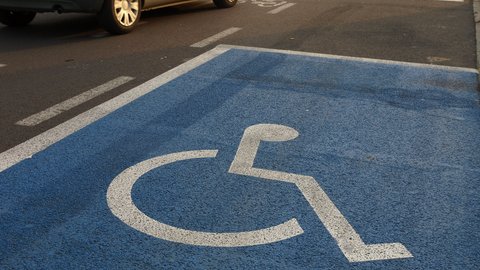Driving licence for hemiplegia and spastic paralysis
That is to be noted!
You suffer from hemiplegia or spastic paralysis, but don't want to do without mobile freedom through your driver's license? In this article, you will find out what you need to bear in mind when dealing with these restrictions on your driver's license.
![[Translate to English:] © lassedesignen / stock.adobe.com Hemiplegia is no obstacle to a driver's license.](/fileadmin/_processed_/6/5/csm_Rollstuhl-Laehmung-Fuehrerschein-AdobeStock-49622485_22fa18d19c.jpg)
![[Translate to English:] © finecki / Fotolia Half-sided paralysis restricts movements of the left or right half of the body either in whole or in part.](/fileadmin/_processed_/8/7/csm_Behinderten-Parkplatz-Fotolia-46938520_ce5b8ad9aa.jpg)
![[Translate to English:] © Dan Race / stock.adobe.com People suffering from spastic paralysis have pathologically increased muscle tension caused by nerve damage.](/fileadmin/_processed_/d/9/csm_Spastik-Arm-Laehmung-AdobeStock-78903272_92d1bc6a84.jpg)
![[Translate to English:] © lightpoet / stock.adobe.com Spastic paralysis can affect individual muscles or entire parts of the body.](/fileadmin/_processed_/3/8/csm_Spastische-Laehmung-AdobeStock-62906627_346c9dfdb6.jpeg)
The Hemiplegia
Half-sided paralysis restricts movements of the left or right half of the body either completely (so-called hemiplegia) or partially (so-called hemiparesis). Both cases are consequences of brain damage. If you suffer from hemiplegia, there is no obstacle to obtaining a driver's license. Mobile freedom can also be gained by people who are paralyzed on one side due to an accident or illness.
What is most important for the driver's license is what caused the hemiplegia. If the paralysis is based on brain damage (e.g. craniocerebral trauma), a more detailed neurological report must be submitted.
In the case of hemiplegic paralysis caused, for example, by a pinched arm or leg, an orthopaedic assessment is sufficient.
For beginners, half-sided paralysis usually causes fewer problems than for people who previously drove a vehicle without paralysis. It is difficult to discard the established habits and the time of relearning is often perceived as very strenuous.
Therefore, it is important to find a driving school that is specialized in this area and that can give relevant tips on retraining as well as pure driving license training.
Die spastische Lähmung
People suffering from spastic paralysis have pathologically increased muscle tension caused by nerve damage. This leads to cramps and to restrictions in mobility (spastic paresis), which of course must also be taken into account when driving a vehicle.
Spastic paralysis can affect individual muscles or entire parts of the body. This does not mean that a driving licence is generally excluded, but a spasticity, depending on the extent, prevents the acquisition of a driving licence. The degree of spasticity is therefore decisive. With regard to driving licences, it must always be decided on a case-by-case basis whether it is possible to obtain them.
We recommend talking to your doctor first. Only when, in his opinion, it is possible to obtain the driving licence despite the spasticity, should the person go to the competent driving licence authority. Through many years of treatment, the doctor in charge has a good overview and can make statements about what is possible with existing spasticity and what is not.
If there are no reservations, nothing stands in the way of driving licence training. The competent driving licence authority will then provide you with all the information you need on what expert opinions are required to obtain the road safety certificate.

Find your driving school
Would you like to learn more about driving training with paralysis? In our search you can easily and quickly discover specialized driving schools in your area and contact them directly without obligation.